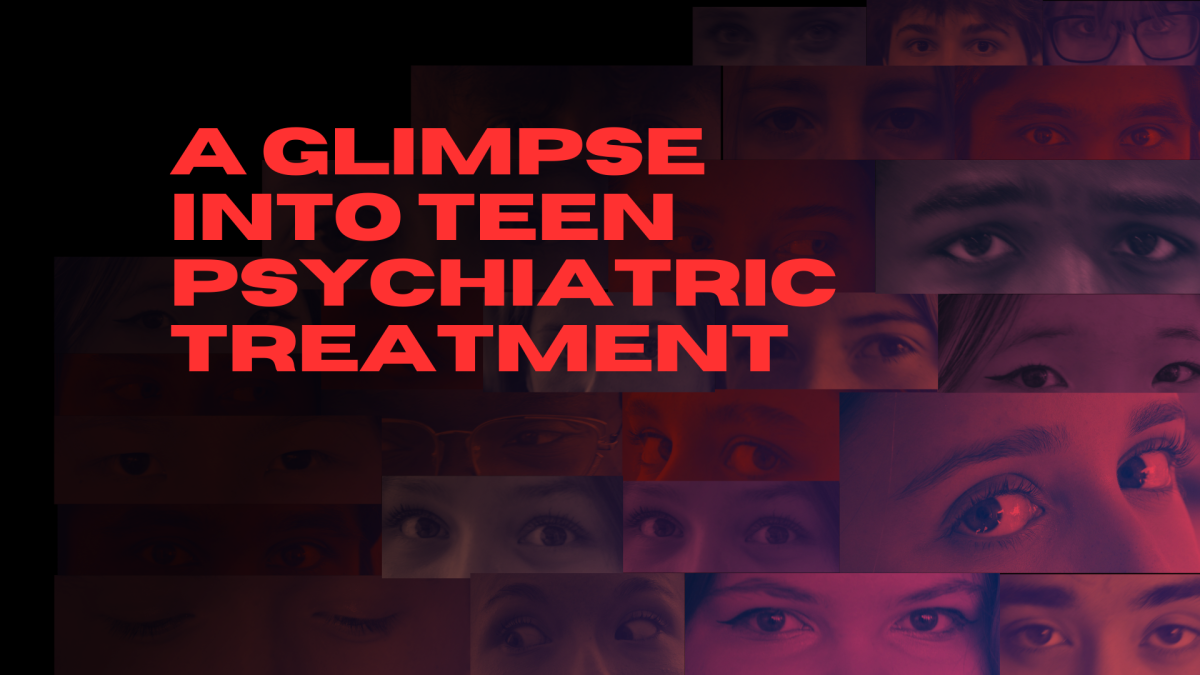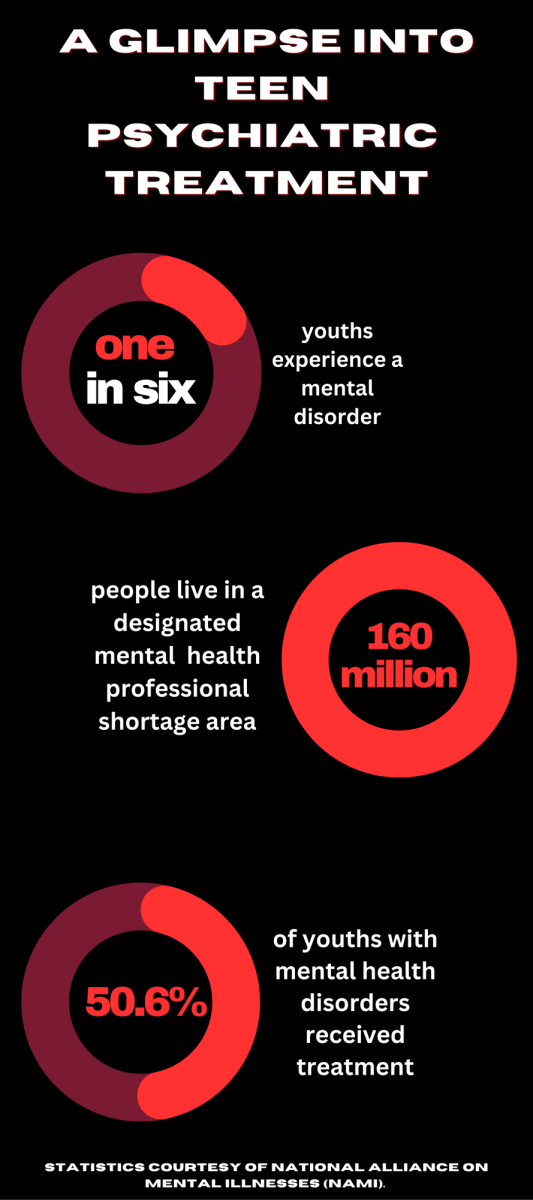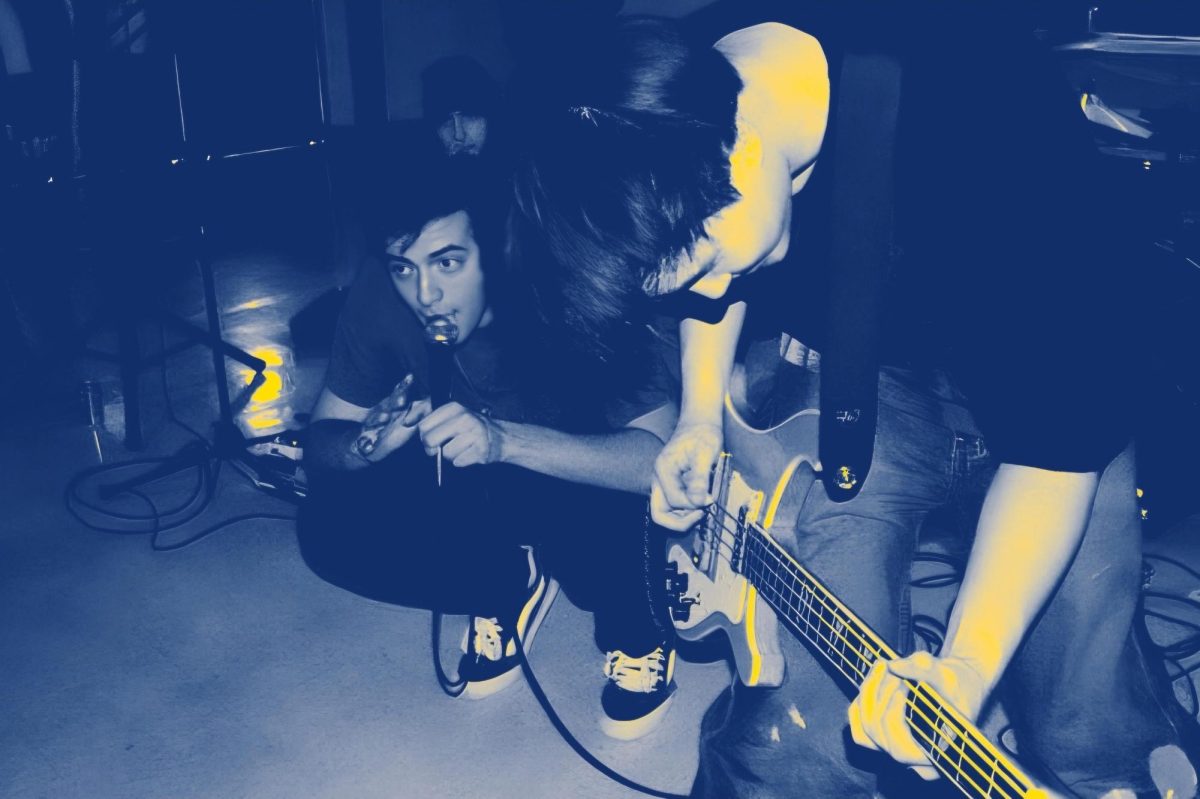
Between every block, thousands of students flood the hallways of Emmaus High School and walk past their classmates. In movies, some high schoolers wear varsity jackets and others carry around books. In reality, many students do both. However, all are unaware of the stress and pressure that their peers may be facing on a daily basis.
While there are many different contributors to negative mental health, being a student athlete is often one of the unseen factors due to the unreasonable pressures and unrealistic expectations placed on them. Whether the pressure stems from athletic or academic standards, it is equally impactful.
Mental health is an issue that affects students around the world every day. Mental Health America claims that depression, one of the main mental health disorders amongst teens, causes almost 5,000 deaths in adolescents each year, and suicide has become one of the leading causes for death amongst youths in America.
Morgan Rogers, a collegiate student athlete who struggled with depression, represents the importance of being aware of poor mental health and the detrimental outcome it can have. In 2017, Rogers faced an extreme knee injury that accelerated her preexisting anxiety and depression. Following the injury, Rogers passed away due to suicide on July 11, 2019. Rogers’ death brought attention to the stigma surrounding the mental health of athletes, which led to the creation of Morgan’s Message. The organization’s mission is to raise awareness of athletes’ mental health and to work to close the gap between physical and mental health to balance the level of support throughout the athletic community.
Being a student is full of time-consuming responsibilities. Adding in the responsibilities of being an athlete, which include being a part of a team, practicing on the daily, and performing at your best, can be difficult to manage.
“I think most pressure put on student athletes is balancing school work and then going out there and performing at your best,” junior Robbie Barnes, Liaison of the EHS chapter of Morgan’s Message, said. “If you don’t perform at your best, then sometimes pressure gets to you and then you don’t really know how to deal with that.”
In addition to being in Morgan’s Message, Barnes is a part of EHS’s baseball team. Being a student athlete, Barnes faces different challenges such as pressure and time management.
During the winter of his sophomore year, Barnes participated in two sports: baseball and swimming. Though he primarily focused on baseball, he still wanted to make time for both passions. He then worked out a plan with Swimming and Diving Coach Tim O’Connor to have a set schedule that balanced both sports. In addition to putting in copious amounts of effort into Barnes’ schedule, O’Connor paid attention to his overall well-being.
“He also would always talk to me about balancing my schoolwork, getting listened [to], and eating right,” Barnes said.
Barnes’ coach always made sure to make him feel seen and heard in every situation. He focuses on his players’ well-being as opposed to only focusing on their performance.
Junior Sarah Palazzo, another one of the several students that wanted to bring the Morgan’s Message organization to EHS and runs the club’s social media, shares her experience with coaches paying attention to the mental health of their team members.
“I think some [coaches] are aware, and some definitely help you,” Palazzo said. “I think some aren’t always aware, which isn’t the best thing because they don’t know what you’re struggling with outside of just the sport.”
Palazzo acknowledged that her sister had some mental struggles in the past, specifically toward the beginning of high school. One of her coaches stepped up and acted as a support system after noticing her struggles.
“Our one coach for field hockey, Kristen Boyer, helped a lot with her mental health,” Palazzo said. “Especially if she wasn’t playing well or when she was struggling with things completely outside of school — completely outside of field hockey, she just helped her a lot throughout that time period.” As an Emmaus social studies teacher and field hockey varsity assistant coach and technical goalkeeping coach, Boyer believes in forming relationships with her athletes to address them in a more personal manner. She takes her players’ struggles into consideration and helps accordingly.
“I think the most important thing is to create a good relationship with them first, like as people, that way we can coach them the best way possible because not everybody is the same, and not everybody is responsive to the same style,” Boyer said. “So I try to make a good relationship with them first.”
Boyer prioritizes the well-being of her players, one of many reasons why the Emmaus Field Hockey team has been very successful.
Though many coaches at Emmaus provide support for their athletes, in the National Coach Survey, only 18 percent of coaches felt highly confident in their ability to provide and connect their athletes with mental health resources.
Many students face some kind of mental struggle, whether it be stress, anxiety, perfectionism, burnout, or self-doubt. This includes the magnified issues that come with being an athlete.
Junior Liam Paradise, the Vice President of Morgan’s Message, shares insight as to why athletes’ struggles may not be given the attention they deserve.
“I feel like mental health is just not like a topic that you really talk about in athletes,” Liam Paradise said. “It’s most of the time ‘oh, they’re just tough, and they play sports, and they’re strong,’ and it’s just not really talked about.”
While it can be difficult for anyone to speak up about poor mental health, it is an especially prominent issue for athletes due to a certain stigma surrounding the issue.
“I think though that there for a really long time has been the stigma that especially as an athlete; you have to be tough and you have to be strong, and like if you are facing especially like mental health struggles, you’re just not supposed to talk about it because you’re not supposed to feel that way,” Boyer said.
Speaking up about a physical injury can be somewhat easy with the amount of care offered from athletic trainers and coaches. For an athlete, physical injuries are very common. Society has made it seem as though physical injuries are the only type of pain an athlete can face.
There has been a standard set in place for athletes that created a way of thinking that is counterproductive to mental well-being: seeking help means being weak. In reality, it takes strength to open up about an issue. Morgan’s Message is helping to terminate the common fear that speaking up about a mental struggle of any kind will alter athletic standings. Struggling in silence is not beneficial and can result in worsened symptoms.

“We all just wanted to start the club because we all struggle with our own things especially since we are all student athletes,” Palazzo said.
Palazzo, along with several other student athletes, wanted to bring a new chapter of the Morgan’s Message organization to Emmaus High School to open up a conversation about mental health rather than suffering in secret.
A large population of EHS students participate in a sport, meaning that many can relate to the internal struggles that sometimes follow. According to the National Federation of State High School Associations, more than 8 million high schoolers participated in a school sport between 2022-23. This means that one in three high school students are athletes, which is a large portion of school communities. In a study conducted by the National Library of Medicine, 91 percent of student athletes reported to face at least some level of stress stemming from their sport.
Stress can increase once overwhelming responsibilities such as homework and practice begin to pile up. Both high school academics and athletics can determine the future of a student, especially for those interested in college, consequently placing more pressure on students to succeed.
“Just being a student athlete, especially in high school, is a huge deal with all the different things you have to think about and especially being a very good and successful student; that’s a lot harder too when you’re an athlete to try and make time to complete your works well outside of sports,” Liam Paradise, vice president of Morgan’s Message said.
Navigating through all of these responsibilities as an adolescent can be quite intimidating. Having to maintain a high GPA in addition to high standings is overwhelming, especially when needing to maintain positive mental health.
“Mental health in sports for us as athletes is kind of hard because you have to balance throughout school and your everyday life, so it takes a big toll on your mental health,” President of Morgan’s Message, Morgann Orobono, said. “That was important to us, and we wanted to share that.”
With three of the Morgan’s Message officers being members of the Emmaus Girls Field Hockey Team, they face many high pressure situations on and off of the field. These pressures are magnified when it comes to being a student and athlete simultaneously.
“At the end of the day, even in a program like Emmaus field hockey that is such a well-run program, it is still a high school sport,” Boyer said. “Our long term health and taking care of ourselves is more important than what’s happening on the field and so taking a break, taking a day, doing something that you really love, that has nothing to do with the sport, I think that those are things that are really important as well.”
At any level of athleticism, mental health can become a struggle. Though facing another team is key to most sports, focusing on internal, mental battles is even more important.
Addison Povilatis, treasurer of Morgan’s Message, faces her own internal battles being a student athlete on the field hockey team.
“Pressures I face as a student athlete is mostly mentality,” Povilatis said. “I think trying to do everything perfectly, well I set a high standard, so trying to do everything the best I can all the time just may not happen.”
Perfectionism is also a common mindset for student athletes. Harvard University’s definition of self-oriented perfectionism is “having unrealistic expectations for yourself, holding yourself to perfect standards, and being hard on yourself when you don’t meet those expectations.” Though many students may struggle with self-oriented perfectionism, many also battle socially-prescribed perfectionism. While these are very similar, socially-prescribed perfectionism is when someone feels external pressures to be perfect rather than internal. This can be the fear of not exceeding the expectations that others have set for you.
“I think that there’s a lot of expectation and pressure on those athletes to perform because people are watching them, and I think that when you maybe fail, let yourself down, [or] don’t play at the level you expect yourself to, it doesn’t just feel like you’re letting yourself down, it feels like you’re letting down your team, like you’re letting everybody down, including your community,” Boyer said.
Whether it be facing internal pressures of wanting to be a perfect athlete or external pressures from peers expecting you to be a perfect student, perfectionism is real and has become an epidemic.
With the rising amount of AP classes offered across the country, students are taking on heavier course loads. Along with higher-level courses comes hefty assignments, which can become overwhelming for many students. According to the College Board, over 80 percent of adolescents ages 12-17 take part in an extracurricular activity. For high school students, stress can originate from a lack of time outside of school, whether it be because of a sport or another extracurricular activity, eliminating time that could otherwise be used toward schoolwork.
Liam Paradise recognizes that practicing and training frequently can eliminate valuable time.
“That’s another pressure point. You have to find time for that, and oftentimes there’s not very much,” Liam Paradise said.
Burnout is a frequent struggle for busy students that tend to not have much time outside of school. It is when a person is constantly feeling exhausted in a state of fatigue, usually associated with being overworked emotionally, physically, and mentally. It can make a student feel drained yet unable to sleep, feel strong emotions yet not care, and many other contradicting and confusing symptoms that only overwork the brain more. Burnout is full of confusion and looks different in everyone, making it easy to slip under the radar even though it is a real struggle.
Starting as more of an emotional stress-based condition, burnout can eventually have negative effects on physical health. This can look like frequent headaches or dizziness, effects of high stress levels.
Though being a student athlete is technically performing at a smaller scale than a professional athlete, stress comes along with both positions.
“Being a student at the same time as being an athlete is a whole different thing than if you’re just playing professionally and that’s your job because you’re doing all the same things, daily practices, and then also having to deal with all of the stress of being a student,” Liam Paradise said.
Managing grades, sports, and clubs comes with an abundance of responsibilities, but it also comes along with anxiety. According to the NCAA, almost 85 percent of athletic trainers believe that anxiety is an issue in student athletes, and is a reason for concern. This concern applies to all anxiety whether it be generalized anxiety or performance anxiety.
Athletic performance anxiety is an extreme state of worry or fear triggered by the suspense leading up to sports events such as games, matches, or tryouts. According to a study published in the National Library of Medicine, younger athletes experience stronger tendencies to worry, facing cognitive anxiety.
In addition to this, the study also reported that compared to the older participants, the younger athletes had a higher level of fear when it comes to negative evaluations. According to Oxford Academic, over half of all students (regardless of being an athlete or not) in education systems surveyed have experienced “fear of failure.”
Fear of failure goes hand-in-hand with perfectionism. The fear of failure is what drives perfectionists to their actions. High school students have a habit of holding their self worth in the opinions of others. While studies suggest that playing a sport can better someone’s self image, it can also break down someone’s identity.
From a coach’s perspective, it is clear to see that athletes’ fear of messing up is a common experience.
“It’s not ‘I’m just upset because I let myself down, or I let my team down, now I’ve let every alumni down, and the entire community and the school’ because there’s this expectation that we perform at this really high level at all times. I think it’s just the added pressure and like eyes on you, even in high school,” Boyer said.
Putting an over abundance of time and effort into a sport or club can be a damaging habit if it turns into an entire identity. After discovering love for a sport, it can be hard for an athlete to see themselves as anything other than a player, and for them to see their worth as anything more than what is on the scoreboard. The Morgan’s Message organization spreads the message “you are more than an athlete,” which can be difficult to remember when facing a conflict in a sport.
Though so many students are suffering from these overwhelming emotions, there is no clear cure.
Liam Paradise urges others to speak up when suffering since the mental health of student athletes is rarely addressed and often ignored.
“The conversation just doesn’t even come up,” Liam Paradise said. “It’s normal for mental health to be a struggle, especially in athletes, and that it’s okay to ask for help if you need it and you don’t have to look tough all the time. It’s okay to ask for help, and that there are resources available to help you, and that help is there if you need it.”
Morgan’s Message is being spread to schools across the country. Her story is being shared and student athletes are addressing these issues that were once ignored and not spoken upon. Though it is a recent addition to EHS, the club provides support for the academic and athletic communities. Morgan’s Message empowers students to foster impactful conversations regarding mental health on and off the court.
Morgan’s Message is not an individual or clinical mental health care, advice, or direction, group therapy or group intervention, or crisis support or intervention.







